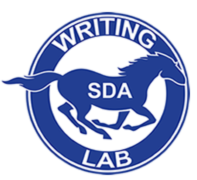I was cleaning up the website when I found this hidden with some abandoned pages. I’m not sure which of the past tutors put this together, but it’s worth sharing/reviewing. I hope you benefit from the information 🙂
-L
Technically, you don’t need to know grammar terms in order to be able to write, but it can be hard to learn how to utilize the full power of a language if you don’t know how to describe what you’re even talking about. A lot of these grammar terms were created to make it easier to talk about languages. And if you can talk about the language, it will be easier to learn it (imagine trying to learn to speak Spanish while trying to speak about Spanish in Spanish). So if you’re a student learning something like why a comma is necessary in front of a coordinating conjunction in order to join two independent clauses just so you can get a better grade on a paper, it’s easier to know the terms than to say something like “that thing that goes before the word that fits between those other words.” That would hardly sound like someone who knows any English at all.
In alphabetical order (almost):
Clause-a part of a sentence made up of a subject and a verb, which can stand on its own as an Independent Clause or be joined with other clauses or phrases to create a sentence.
Compound Sentence-a sentence made when independent clauses are joined together by a coordinating conjunction, a transitional expression, or a semi-colon.
Complex Sentence-a sentence that is created when two independent clauses are joined together by a subordinating conjunction, making one clause dependent as a subordinate of the other (so to speak).
Compound-Complex Sentence-a sentence that is made up of both independent and dependent clauses that have been joined by both subordinating conjunctions and coordinating conjunctions. Much like the name itself implies, this type of sentence is pretty much a combination of the Compound and Complex sentence types.
Conjunction-a word that joins clauses and phrases.
Coordinating Conjunction-a type of clause that emphasizes a logical relationship between the clauses and/or phrases it is joining. Examples: and, but, or, so, for, yet, nor.
Dependent Clause-a clause that can only be a sentence when attached to an Independent Clause using a Subordinating Conjunction. Conjunctions join clauses, and a subordinating conjunction joins the dependent clause, which cannot stand on its own, with an independent clause, which can stand on its own. The Dependent Clause is DEPENDENT on the Independent Clause because it is the subordinate of the Independent clause.
Independent Clause-a clause (subject+verb) that can stand on its own as a sentence or be combined with other clauses or phrases to form more intricate sentences.
Phrase-similar to a clause, except that a phrase lacks either a subject or a verb or both. A phrase cannot stand on it’s own because a sentence is not complete unless it has both a subject and a verb. An Independent Clause is often attached to a phrase in order to make a complete sentence.
Object-the person/place/thing/whatever to which something is being done.
Simple Sentence-essentially, it the most basic sentence from. It has to have a subject and a verb to be a sentence (subject+verb=Independent Clause).
Subject-the person/place/thing/whatever that is doing something.
Subordinating Conjunction-a type of clause that emphasizes a specific relationship between clauses or phrases, where we can’t grasp the full meaning of the sentence until we know how the subordinate part relates to the other. Examples: after, although, as, because, before, if, since, though, unless, until, when, while (etc.)
Verb-an action (like “run,” “laugh,” “think,” “feel,” “be,” “exist”)
